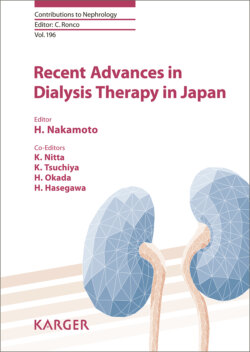Читать книгу Recent Advances in Dialysis Therapy in Japan - Группа авторов - Страница 85
На сайте Литреса книга снята с продажи.
Hemodialysis-Induced Hyperglycemia
ОглавлениеWhen glycemic control is poor in diabetes patients on hemodialysis, the plasma glucose levels differ widely between non-dialysis days and dialysis days. In these cases, a state called “hemodialysis-induced hyperglycemia” may occur, in which the plasma glucose level drops during and increases after hemodialysis [7]. Reduction of plasma glucose during hemodialysis is due to diffusion of plasma glucose into the dialysate and penetration into red blood cells. On the other hand, hyperglycemia after hemodialysis is caused by adsorption and removal by the dialyzer of previously administered insulin and secretion of hyperglycemic hormone in response to hypoglycemia during hemodialysis [7]. In such cases, supplementing insulin after dialysis should be considered. Also, to improve general glycemic control, changing insulin dosage and administration times between dialysis and non-dialysis days should be considered. To prevent plasma glucose fluctuation during hemodialysis, hyperglycemia must be corrected before starting hemodialysis. In addition, sudden decreases in plasma glucose levels should be prevented during hemodialysis by increasing the glucose concentration of the dialysate [2].
